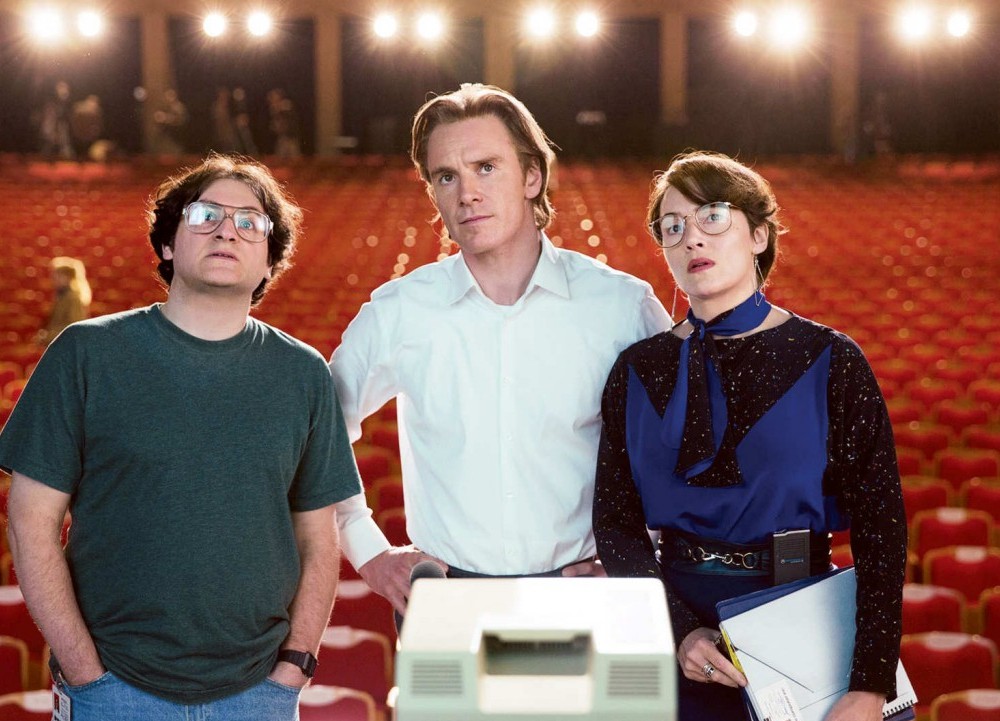Positioning itself nicely amongst the forerunners for the Oscars next year, ‘Steve Jobs’ sees previous Oscar winner Danny Boyle (I think you might be able to see Ewen Bremner as one of the skinheads in the Mac promo advert at one point) direct Michael Fassbender as the titular late co-founder of Apple, along with Kate Winslet as his assistant, or his work-wife as she puts it in the film, Joanna Hoffman. The most immediately striking thing about the story, which the trailer was at pains to project, is that it hits the essential nail right on its head – what did Steve Jobs actually do? What was it that made the world’s media effectively deify him?
Herein lies the essence of the entire film, as an intricate character study unfolds against the backdrop of three Apple product launches (one in 1984 shot in 16mm, then 88 in 35mm and 98 filmed digitally) and numerous fictional conversations with the most important people in Jobs’s life, all in the moments before he steps onto the stage at the various theatrical venues. This approach is instantly reminiscent of last year’s ‘Birdman‘, and indeed there appears to be a nod to ‘The Imitation Game‘ as well with an enormous painting of Alan Turing at one point, but the screenplay from Aaron Sorkin (‘A Few Good Men’ 92, ‘Malice’ 93, ‘The Social Network’ 10) works incredibly well at giving us an insightful taste into what made the man and indeed what the man was made of, as our opinion of him is pulled this way and that and all players dance around the flame of his ego, ever burning with his desire to have end-to-end control of his products.
The movie opens with archival footage of an interview with the legendary Arthur C. Clarke (you can see the interview on his Wikipedia page, in the Sri Lanka section) detailing what he predicts the future of technology will mean for the human race and its way of living, demonstrating that all of the products that Apple have come out with were simply a natural and inevitable result of where science was taking us and nicely framing the debate over whether Jobs’s approach was sensible or just narrow minded, or perhaps sensible for himself at the expense of everyone else (if you’ve ever had to integrate Apple and Microsoft hardware, Jobs will most likely not be one of your heroes).
Once again Boyle anchors and drives forth his work with fantastic use of music – beats underpin what would otherwise be fairly dry scenes of multiple conversations and actually manage to make them exciting, giving a palpable sense of rhythm to the narrative and a distinction to each section whilst Daniel Pemberton’s score still manages to unify everything nicely. It’s a highly original way to deliver a complex biography and it works on every level, with only some of the sections with John Sculley (Jeff Daniels) acting as a surrogate father, and things seguing into Jobs’s childhood, feeling a little forced. The wonderful writing and direction are completely matched by the acting throughout, but especially so from the leads and both Ripley Sobo and Makenzie Moss as nine and five-year-old Lisa Brennan-Jobs respectively.
It’s enthralling to watch and ponder over, as Jobs suffers the drive to prove himself to the extreme in order to fill an ever gnawing void, with the fear of being sidelined if he relaxes control extending into, arguably grounded, paranoia regarding betrayal by those around him, and the irritation of being hounded by people trying to put obstacles in his way instead of realising what he was attempting to create. It has to be an Oscar nod for Fassbender, who one suspects could end up giving Daniel Day-Lewis a run for his money eventually, and who here commands the screen and the people around him the way you imagine Jobs would have done, with an unwavering accent to boot and utter conviction that Apple’s products are his and are more important than life itself. With equally great support from Seth Rogen and Michael Stuhlbarg.


